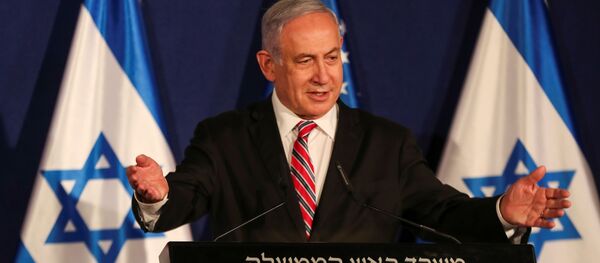With less than three months left until Israeli elections set for 23 March, local analysts predict it won't be an easy race for Prime Minister Benjamin Netanyahu.
According to a recent poll, the PM is projected to get 28 seats in the upcoming elections, the fourth under two years, and although his party will retain the title of Israel's largest, it is far from certain that he will manage to build the next coalition.
Netanyahu's main challenger, Gideon Saar is right behind the PM, gaining 19 out of the Israeli parliament's 120 seats.
His other challengers, including former Defence Minister Naftali Bennett and the head of the opposition Yair Lapid are projected to get 13 and 16 respectively, and that means that Netanyahu might face a serious threat to his more than decade-long run in the country's top spot.
Won't Change Much
The prospect of Netanyahu's ouster gives hope to many in Israel who wish to see him go.
But for Palestinians, who will be watching the upcoming race closely, another round of Israeli elections will not bring about much-needed change.
"I doubt that the Palestinians will gain anything from this race", says Abdul Sattar Qassim, a political analyst based in the West Bank. "Whoever wins that battle won't change the facts on the ground".
In fact, the failure of Netanyahu to form a government might make the situation for the Palestinians even worse.
Known for his conservative approach to education, illegal immigrants, and expansion activity in the West Bank, Saar will not make it easy for the Palestinians to achieve any political gains.
Nor is he expected to make concessions when it comes to the establishment of their own independent state.
"Israeli society is now leaning towards the extreme right. And that concept doesn't recognise Palestinian rights. Nor will it give us an opportunity to establish our own state on the borders of 1967", the expert believes.
In the last three rounds of national polls, conservative and ultra-Orthodox parties have received more seats in parliament than those associated with a more liberal camp, and a 2019 poll found that the country's youth was much more conservative and hawkish than their peers in Europe.
Striving for Peace?
Another 2019 poll found that most Israelis were supportive of resolving the Israeli-Palestinian conflict. According to that survey, 73 percent of secular Israelis said they would like to see a two-state solution in place. Similar views were expressed by those that identify themselves with left-leaning circles (97 percent) and those who associate themselves with the right (40 percent).

But while Netanyahu was able to achieve what his predecessors failed to, Qassim says he still poses a risk to achieving peace.
It was under him that Israel expanded its presence in the West Bank, building more residential units than any other prime minister and it was under him that the idea of chopping off parts of that area was officially rolled out, much to the frustration of the Palestinian people.
"There are some politicians in the Palestinian Authority that will be happy to see him go. They think they will renew negotiations with the Israelis and reach a peace deal with them, once he is out of the way but I honestly don't see it happening. For me, prospects still look bleak, because Israelis don't want to reach a two-state solution".



